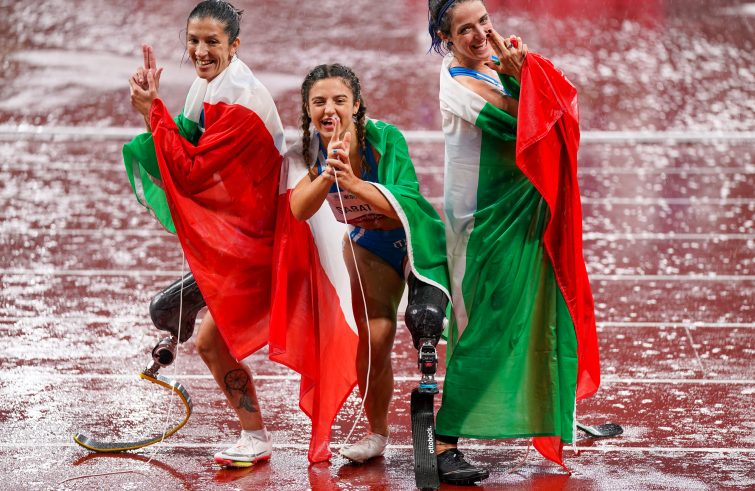
The 16th Tokyo 2020 Paralympic Games are over. The long-running Japanese sporting season ended yesterday with a victorious outcome for the Italian team.
With 69 medals won by Italian athletes (14 gold medals, 29 silver medals and 26 bronze), Paralympic sports have shown tremendous progress,
with many top placings achieved by 115 athletes – 69 of whom are first-timers – representative of 15% of Italians living with disabilities.
“Prior to the London 2012 Paralympics, just over 1.5% of people with disabilities in Italy participated in sports. It amounts to almost 10% today.
During the past nine years, i.e. since the discovery of the beauty and value of Paralympic sports by media outlets, combined with strong interest from TV broadcasters, the sporting offer has improved significantly. This is also due to the government’s decision to recognise the Italian Paralympic Committee (IPC) as a public partner, thereby allocating the necessary State funding,” the president of the Italian Federation of Paralympic and Experimental Sports ( FISPES) Sandrino Porru, in charge of athletics, amputee football, cerebral palsy football and wheelchair rugby, told SIR.
According to Porru, a Paralympic athlete at the Seoul 1988 and Barcelona 1992 Games, “thanks to this first step, the Italian National Olympic Committee (CIP) improved its organisational structure with respect to the various sports disciplines it promotes, delegating to the national sports federations recognised by the Italian National Olympic Committee (CONI), whenever possible, the Paralympic section of the disciplines they cover, and setting up Paralympic sports federations for those disciplines not yet eligible for delegation: for example, athletics, swimming, wheelchair basketball, and the disciplines practised by persons with visual and hearing impairments and by persons with relational intellectual disabilities.”
This experience “resulted in a tremendous increase in the number of athletes, although the figure remains very low considering the number of those who could practise sports.”
However, he went on, “while there are plenty of opportunities for growth, we must also take into account various cultural aspects and the existing and/or lacking sports infrastructure. Sports facilities are extremely scarce and low-quality, and in some southern regions they are non-existent. Moreover, major problems of accessibility are frequent in existing facilities. These aspects, usually due to insensitivity stemming from ignorance, make it necessary to expand the cultural revolution process that Paralympism so strongly represents, over and above sport.” For the president of FISPES we need to
“focus on a person’s ability to do what they believe they can do, in sport and in life.
I believe that, today more than ever, special attention should be paid to children and their families, whom I consider to be the prime motivators for promoting suitable sporting opportunities for this underrepresented social group and, in particular, for fostering a new societal awareness, with the younger generations leading the way.”
The impressive achievements in Tokyo, crowned by Sabatini – Caironi – Contrafatto on the podium for the 100-meter final in the T63 category (amputees), testify to the excellence of the Italian Paralympic world:
“In contrast to all those who continue devaluing our country compared to other European nations, Italy is undoubtedly in the vanguard of Paralympics,”
Porru pointed out. Delegations from many foreign countries have come to study our organisational model, amazed by our impressive institutional achievements and undisputed successes in terms of sporting accomplishments, number of athletes, visibility and cultural growth. Evidence of this is also the recognition of equal dignity for Olympic and Paralympic athletes within the military sports groups.
As of today – unthinkable in the past – Paralympic athletes will also be eligible for enrolment in the military at the end of their sporting career, carried out within their Sports Groups.
This will offer job opportunities to those who, despite living with a disability, have represented our country in all national and international competitions.”
The Italian Paralympic Committee’s relations with the education system, and with the Ministry for Education, Universities and Research in particular, are developing further, with a number of memoranda of understanding concerning the organisation of sports and recreational activities for students, including joint activities for disabled and non-disabled people.
The rehabilitation centres sector is extremely important, Porru said, “a reality that gave birth to the Paralympic movement in the post-war period, through which, thanks to the expertise of our local organisations, children recently affected by disabilities can take part in recreational sporting activities that complement their rehabilitation programmes, thus helping them to improve and perfect their other abilities.”
According to Porru, the extensive efforts made by Italy’s national public broadcasting company (RAI) during the ten-day competitions in Tokyo “will significantly increase the number of people wishing to participate in Paralympics, and we will do our utmost to receive them and work together on other challenging sporting and social projects.”
Although disabilities have been culturally equated with inability, and consequently dismissed as a social burden to be borne and supported by social welfare, often as an end in itself, for Sandrino Porru
“Through sport, Paralympism has demonstrated to the world that we are all capable of doing everything, just in a different and exclusive way.
This has won the hearts of the world. The opening and closing ceremonies of the Tokyo Paralympics were entirely performed and staged by persons with disabilities, and had it not been for the commentators highlighting this aspect, many of the performances would have been viewed without judgment and with total acceptance of their normality. That’s the miracle of Paralympism, which went from being a sports movement to becoming an increasingly popular social model, marvelling at the abilities and talents of each person for the benefit of all and for the common good. We will no longer be speaking of immigrants, non-EU citizens, the disabled, gender, the elderly, women and men, but only of “Persons.” As one of the mottos of the Italian Paralympics goes, this is indeed to move onward and beyond.












